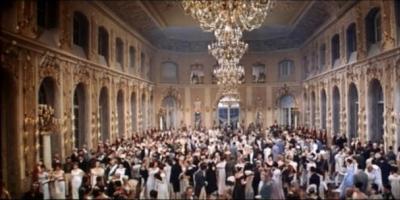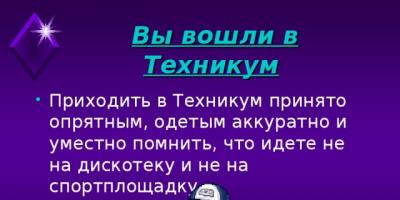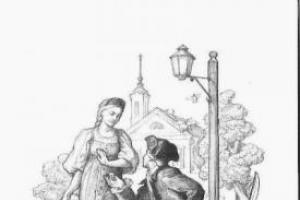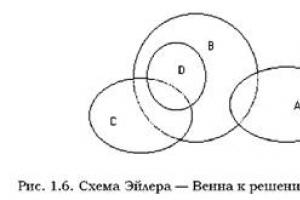The poem “How often, surrounded by a motley crowd...” was written by M.Yu. Lermontov in 1840. It was created under the impression of a secular New Year's ball. I.S. Turgenev, who was present at this ball, recalled: “I saw Lermontov at a masquerade in the Noble Assembly, on New Year’s Eve 1840... Internally, Lermontov was probably deeply bored; he was suffocating in the cramped sphere into which fate had pushed him... At the ball... he was given no rest, they constantly pestered him, took him by the hands; one mask was replaced by another, and he almost did not move from his place and listened to their squeaks, turning his gloomy eyes on them in turn. It seemed to me then that I caught on his face the beautiful expression of poetic creativity. Perhaps those verses came to his mind:
When they touch my cold hands
With the careless courage of city beauties
Hands that have long been indefatigable..."
The style of the work is romantic, the main theme is the confrontation between the lyrical hero and the crowd.
The poem is built on a sharp contrast between reality and the poet's ideal. The main images of the real world are a “motley crowd”, “images of soulless people”, “masks pulled together with decency”. This crowd is devoid of individuality, people are indistinguishable, all colors and sounds here are muffled:
How often, surrounded by a motley crowd,
When in front of me, as if through a dream.
With the noise of music and dancing.
With the wild whisper of closed speeches
Images of soulless people flash by.
Masks pulled down with decency...
The picture of a masquerade reminds us of a nightmare; time here seems to have frozen, become motionless. To emphasize this, the poet uses a few verbs in the present tense. And outwardly the hero is immersed in this frozen, lifeless element. However, internally he is free, his thoughts are turned to his “old dream”, who is truly dear and close to him:
And if somehow for a moment I succeed
Forget yourself - in memory of recent times
I fly as a free, free bird;
And I see myself as a child, and all around
Native all places: high manor house
And a garden with a destroyed greenhouse.
The main images of the “ancient dream” of the lyrical hero are “native places”, “sleeping pond”, “tall manor house”, “dark alley”, green grass, a fading ray of sun. This dream is like a “blooming island among the seas.” Researchers noted here a situation where dreams were constrained by the surrounding hostile elements. This is precisely how strong the hero’s impulse for freedom is, his desire to overcome this constraint, to break out of hostile captivity. This impulse is captured in the final lines of the work:
When, having come to my senses, will I recognize the deception?
And the noise of the human crowd will frighten away my dream,
An uninvited guest for the holiday,
Oh, how I want to confuse their gaiety
And boldly throw an iron verse into their eyes,
Doused with bitterness and anger!..
Compositionally, we can distinguish three parts in the poem. The first part is a description of the masquerade (the first two stanzas). The second part is the lyrical hero’s appeal to his sweet dream. And the third part (last stanza) is his return to reality. Thus, we have a ring composition here.
The poem is written using a combination of iambic hexameter and iambic tetrameter. The poet uses various means of artistic expression: epithets (“with a motley crowd”, “with a wild whisper”, “azure fire”, “with a pink smile”), metaphor (“Caresing an ancient dream in the soul”, “And boldly throw an iron verse, Doused with bitterness and anger!”), anaphora and comparison (“With eyes full of azure fire, With a pink smile, like the first glow of a young day Behind the grove”), lexical repetition (“I am flying as a free, free bird”). At the phonetic level, we note alliteration and assonance (“With eyes full of azure fire”).
How often, surrounded by a motley crowd,
When in front of me, as if through a dream,
With the noise of music and dancing,
With the wild whisper of closed speeches,
Images of soulless people flash by,
Decorously pulled masks,
When they touch my cold hands
With the careless courage of city beauties
Long-time fearless hands, -
Externally immersed in their splendor and vanity,
I caress in my soul an ancient dream,
Holy sounds of the lost years.
And if somehow for a moment I succeed
Forget yourself - in memory of recent times
I fly as a free, free bird;
And I see myself as a child, and all around
All native places: tall manor house
And a garden with a destroyed greenhouse;
The sleeping pond is covered with a green network of grasses,
And beyond the pond the village is smoking - and they get up
In the distance there are fogs over the fields.
I enter a dark alley; through the bushes
The evening ray looks and the yellow sheets
They make noise under timid steps.
And a strange melancholy is already pressing in my chest;
I think about her, I cry and love her,
I love my creation dreams
With eyes full of azure fire,
With a smile as pink as a young day
The first light appears behind the grove.
So the omnipotent lord of the wondrous kingdom -
I sat alone for long hours,
And their memory is still alive
Under a storm of painful doubts and passions,
Like a fresh island, harmless among the seas
Blooms in their damp desert.
When, having come to my senses, will I recognize the deception?
And the noise of the human crowd will frighten away my dream,
An uninvited guest for the holiday,
Oh, how I want to confuse their gaiety
And boldly throw an iron verse into their eyes,
Doused with bitterness and anger!..
Analysis of the poem “How often, surrounded by a motley crowd” by Lermontov
M. Yu. Lermontov towards the end of his life completely lost interest in the secular way of life. From birth he was characterized by a desire for loneliness, intensified by his passion for romanticism. Lermontov had strong convictions that he could not freely express in high circles. His open views aroused ridicule and suspicion. This closed the poet even more into himself; he gave the impression of a constantly gloomy and gloomy person. But his noble position obliged him to attend the most important social balls. One of these masquerade balls took place in January 1840. The poet reluctantly attended it and expressed his feelings in the poem “How often, surrounded by a motley crowd...”.
Already from the first lines, the poet’s irritation with what is happening is felt. The balls were accompanied by strict decorum and elegant speeches to the sounds of beautiful music. Lermontov’s description of the ball gives a completely different picture: “dance”, “wild whisper”, “soulless images”. The author knows that everyone present perfectly understands the unnaturalness of what is happening, but will never admit it. Any ball is saturated with falsehood and deception. People's conversations make no sense and do not touch on any significant topics. Mutual hatred and malice are hidden under masks. Moreover, by masks Lermontov means not so much paper decorations as unnatural faces of people. Universally recognized beauties have long lost their freshness and charm, their feelings have been dulled by endless romances.
Lermontov's only salvation during the ball is to be carried away by memories of his distant childhood with his naive dreams and hopes. Only as a child could the poet surrender himself wholeheartedly to the beauty of the surrounding landscape. He was not yet familiar with the vicious and deceitful human society. These memories awaken in the author’s heart a long-forgotten feeling of pure love for life. They allow him to feel young and full of energy again. Lermontov can remain in such pleasant oblivion for a long time, protecting himself from the outside world. It was precisely for this complete immersion in himself that the poet gained the bad reputation of a closed and unsociable person.
The longer the poet remains in this state, the more painful and tragic his parting with him. “The noise of a crowd of people” brings him to his senses. Lermontov, as if after a deep sleep, looks around with horror and again sees the hateful picture of disgusting fun. This infuriates him. The poet dreams of breaking the idyll with some daring trick. Realizing that this will lead to the final decline of his authority, Lermontov limits himself to “iron verse,” which became the work “How often, surrounded by a motley crowd...”.
The themes of Lermontov's poems have always been varied, but lyrics occupied a special place in the work of the great Russian classic. Mikhail Yuryevich, as a teenager, always dreamed of going to the ball and shining at the ball, but when his dream finally came true, he realized how hypocritical all the people around him were. The man quickly lost interest in techniques and pompous conversations that were meaningless and radically different from the surrounding reality.
An analysis of Lermontov’s “How often surrounded by a motley crowd” makes it possible to understand how difficult it was for the poet to be among those who put on friendly masks, but have no heart, pity and conscience. Mikhail Yuryevich himself did not know how to conduct small talk, he never complimented women, and when etiquette required him to carry on a conversation, he became too sarcastic and harsh. Therefore, Lermontov was called a rude and ill-mannered person who despises etiquette.
The poem “How often surrounded by a motley crowd” was written in January 1840, just during this period the writer received a vacation and came to stay in Moscow for several weeks. At this time, winter balls were held one after another, although Mikhail Yuryevich did not want to attend social events, but he could not ignore them. An analysis of Lermontov’s “How often surrounded by a motley crowd” allows us to understand how alien the people around him are to the author. He is among the bustle of colorfully dressed ladies and gentlemen, conducting small talk, and he himself is immersed in thoughts about irrevocably past days.

Mikhail Lermontov kept in his memory memories of his childhood, when he was still happy. The poet’s thoughts take him to the village of Mikhailovskoye, where he lived with his parents. He cherishes that period of carefree childhood, when his mother was alive, and he could spend hours wandering around the garden with a destroyed greenhouse, stirring up fallen yellow leaves and living in a tall manor house. An analysis of Lermontov’s “How often surrounded by a motley crowd” shows how different the idealistic picture drawn by the author’s imagination is from reality, in which he is surrounded by images of soulless people, and one can hear the “whisper of confirmed speeches.”
At social receptions, Mikhail Yuryevich preferred to retire to a secluded place and indulge in dreams there. He personified his dreams with a mysterious stranger, he himself invented her image and found it so charming that he could sit for hours without noticing the bustle and noise of the crowd scurrying around. An analysis of Lermontov’s “How often surrounded by a motley crowd” makes it possible to understand how difficult it was for the poet to restrain his feelings and cover his impulses with an insensitive mask.

Mikhail's moments of solitude would sooner or later end, and one of those present would interrupt his dreams with meaningless chatter. At the moment of returning to the real world of affectation and lies, he really wanted to throw something caustic in the eyes of the hypocrites, to shower them with anger and bitterness, to ruin the fun. The poem “How often surrounded by a motley crowd” ideally characterizes the unpredictable and contradictory inner world of the poet, because it combines both romance and aggression.
How often, surrounded by a motley crowd (Lermontov)
“How often, surrounded by a motley crowd”
How often, surrounded by a motley crowd,
When in front of me, as if through a dream,
With the noise of music and dancing,
With the wild whisper of closed speeches,
Images of soulless people flash by,
Decorously pulled masks,
When they touch my cold hands
With the careless courage of city beauties
Long-time fearless hands, -
Externally immersed in their splendor and vanity,
I caress in my soul an ancient dream,
Holy sounds of the lost years.
And if somehow for a moment I succeed
Forget yourself - in memory of recent times
I fly as a free, free bird;
And I see myself as a child; and all around
All native places: tall manor house
And a garden with a destroyed greenhouse;
The sleeping pond is covered with a green network of grasses,
And beyond the pond the village is smoking - and they get up
In the distance there are fogs over the fields.
I enter a dark alley; through the bushes
The evening ray looks and the yellow sheets
They make noise under timid steps.
And a strange melancholy is already pressing in my chest:
I think about her, I cry and love her,
I love my creation dreams
With eyes full of azure fire,
With a smile as pink as a young day
The first light appears behind the grove.
So the omnipotent lord of the wondrous kingdom -
I sat alone for long hours,
And their memory is still alive
Under a storm of painful doubts and passions,
Like a fresh island, harmless among the seas
Blooms in their damp desert.
When, having come to my senses, I recognize the deception,
And the noise of the human crowd will frighten away my dream,
An uninvited guest for the holiday,
Oh, how I want to confuse their gaiety,
And boldly throw an iron verse into their eyes,
Doused with bitterness and anger!..
M.Yu. Lermontov
“How often surrounded by a motley crowd”- a creative work in poetic form, created in 1840 by Mikhail Yuryevich Lermontov.
This poem is rated by many critics as one of Lermontov’s most significant poems, close to “The Death of a Poet” in its mood and emotional pathos. According to contemporaries, this poem was written after Lermontov visited a masquerade on the night of January 1-2, 1840. The publication led to new persecution of the poet, who had recently been “forgiven.” The theme of the masquerade is symbolic. Comparing the poem with “Masquerade”, it is easy to understand that ridicule of specific features of life is nothing more than the poet emphasizing all the falseness of secular society. The imaginary past, bright dreams compete in the poet’s mind with a ghostly reality, saturated with lies and “mask”. And this dirt of reality evokes nothing but contempt in Lermontov’s soul.
Literature
- Collection “Lermontov “Lyrics”” edited by E. D. Volzhina.
- Collection “Lermontov “Selected Poems””, edited in 1982.
| Mikhail Yurjevich Lermontov | ||
|---|---|---|
| Prose | Ashik-Kerib · Vadim · Hero of our time · Caucasian (essay) · Princess Ligovskaya · Panorama of Moscow · Stoss · I want to tell you |  |
| Poems | Azrael · Angel of Death · Aul Bastunji · Fugitive · Boyar Orsha · Two slave girls · Daemon · Giulio · Izmail Bay · Confession · The Last Son of Liberty · Prisoner of the Caucasus · Calla lilies · Corsair · Litvinka · Mongo · Sailor · Mtsyri · Oleg · A song about Tsar Ivan Vasilyevich, a young oprichnik and the daring merchant Kalashnikov · Criminal · Sashka · Fairy tale for children · Tambov treasurer · Hadji Abrek · Circassians | |
| Plays | Arbenin · Two brothers · Spaniards · Masquerade · A strange man · Gypsies (sketch) · Menschen und Leidenschaften (people and passions) | |
| Poems | Angel · Ballad (In the hut late at night...) · Ballad (Over the sea, a beautiful maiden...) · Barteneva · Bashilov · Gratitude · Thank you · Shining clouds pass... · The battle · Borodino · Bukharina · To the album · Valerik · Venice · Spring · Palestine branch · Evening after the rain · Look at this face... · Vision · Airship · Will · I go out alone on the road… · To a stupid beauty · I look at the future with fear... · Countess Rostopchina · Hussar · Gifts of Terek · Two giants · Agreement · Dodo · Thought · There are speeches - meaning... · Desire · Cupid's Fallacy · Forget your hopes again... · Will · Star (Above one...) · Call hope a dream... · And boring and sad · From Goethe (Mountain peaks...) · From under the mysterious, cold · half masks... · Confession · Be with me as you were before... · My friend, your efforts are in vain!.. · I will not humiliate myself before you... · When you listen coldly... · To the portrait · Cossack lullaby song · Like the spirit of despair and evil... · Dagger · Cemetery · If only in the humility of ignorance... · When the yellowing field is agitated... · When word spreads to you about a story... · leaf · Dead Man's Love · Martynova · The blizzard is noisy and the snow is falling... · My demon · Prayer (Don't blame me...) · Monologue · On secular chains... · In the wild north it stands alone... · On silver spurs... · Hope · Naryshkina · The day will come - and the world will condemn... · Do not laugh… · People often scolded... · No, it’s not you that I love so passionately... · No, I'm not Byron, I'm different... · Beggar · Alone among the noise of people... · Loneliness · He was born for happiness... · She sings - and the sounds melt away... · They loved each other… · Fear · Excerpt · From what · Sail · There is a piece of paper in front of me... · Dedication to N.N. · Poet · Prediction · You are beautiful, fields... · Prophet · Goodbye, unwashed Russia... · Let me love someone... · Parting · Repentance · We parted, but your portrait... · To kid · Motherland · Mermaid · Russian melody · Saburova · It's finished! fully expect... · September 28 · Silhouette · Blind, inspired by suffering... · Can I hear your voice... · Feel free to believe in what is eternal... · Death of poet · Advice · Neighbor · Rushing north from afar... · Stanzas (Look...) · Stanzas (Instantly running through the mind...) · Happy moment · Tamara · Three palm trees · Cane · Clouds · You could have been a better king... · Uvarova · The terrible fate of father and son... · Prisoner · Cliff · Shcherbatova · Epitaph · I saw her once in the cheerful whirlwind of the ball... · I saw a shadow of bliss; but quite... · I want to live! I want sadness.. · I am not for angels and heaven... · I do not love you… · How often, surrounded by a motley crowd | |
The poem “How often surrounded by a motley crowd” is considered one of the most intimate lyrical confessions in the history of Russian poetry. Pessimism and a tragic attitude can be read literally in every line. A brief analysis of “How often surrounded by a motley crowd” according to plan will help schoolchildren in a literature lesson in the 10th grade to better understand how Lermontov saw the world.
Brief Analysis
History of creation- this poem was written under the impression of a costume ball, which was given in honor of the New Year holidays and which was attended by the emperor himself. That is why Nicholas the First perceived this work as an insult to himself personally.
Theme of the poem– denunciation of secular society: soulless, cold and constantly hiding behind masks.
Composition– it can be conditionally divided into three parts. The first consists of two stanzas and describes a world alien to the poet, noisy and brilliant, but empty inside. The second part is a story about his bright dreams, when the past and the imaginary are more valuable to him than the present and the real. And in the third part, the lyrical hero challenges the people having fun.
Genre- lyric poem.
Poetic size- a combination of iambic tetrameter and iambic hexameter.
Epithets – “motley crowd”, “soulless people”, “cold hands”, “an ancient dream”, “free bird”.
Metaphors – “I caress the dream”, “the village is smoking”, “the yellow sheets are rustling”, “the noise of the crowd will scare away”.
Comparison – “like a young day behind the grove the first light”, “like a fresh island harmless among the seas”.
History of creation
Turgenev in his memoirs talked about the New Year's holiday - a masquerade ball, which Lermontov was also present at. According to the writer, the young man was clearly uncomfortable in the crowd of people who did not give him peace. Somewhere in this crowd the Russian emperor got lost. Lermontov looked detached and sad.
It was after this ball that the poet wrote the poem “How often surrounded by a motley crowd,” adding the author’s epigraph, which clearly indicated the date of the event - January 1, 1840. By this he aroused considerable anger from Nicholas the First, who immediately realized what kind of people became the objects of this poetic accusation. In a certain way, it also affected the royal family, so that the hostile attitude towards Lermontov on the part of the emperor worsened even more.
The verse was published in “Notes of the Fatherland” in the year it was written. Critics praised him highly - it became clear that a new luminary was rising in the horizon of Russian poetry, and this was a civic poet, striving to turn the poetic word into the fight against the vices of society.
Subject
The poem talks about the coldness and soullessness of secular society on the one hand and the bright places of the poet on the other. It is obvious that, being surrounded by such people, the lyrical hero will never be able to live the way he wants. The main idea of the work is the constant confrontation between man and the crowd, which is the central theme of all Lermontov’s poetry.
Composition
The theme is revealed by Lermontov through the contrast between parts of the poem, which clearly demonstrates the poet’s pessimistic views and his gloomy mood. Thanks to the overlap between the first and third parts, he creates a frame composition.
So, in the first part he recreates a retrospective of the ball, where everything is noisy and shiny, but people are hiding behind masks. They are having fun and do not want to leave the poet alone, who sees everything around him as deathly and frightening.
In contrast to this, in the second part of the poem his childhood memories of his native places, of long walks in nature and sweet loneliness, when he could simply be alone with life, appear.
And the more difficult it is for the poet, lost in dreams, to return to the ballroom - therefore, the third part not only echoes the first, it is filled with anger: the poet wants to throw his accusatory poems in the faces of these people.
Genre
This is a lyrical poem, written in Lermontov's usual accusatory manner. The lyrical hero is opposed to society, active protest is opposed to idle gaiety. The poem is written in iambic tetrameter and hexameter.
Means of expression
The poet uses quite a lot of expressive means, which makes his work not only bright and emotional, but also rich in artistic images. Thus, Lermontov uses the following tropes:
- Epithets- “motley crowd”, “soulless people”, “cold hands”, “an old dream”, “free bird”.
- Metaphors- “I caress the dream”, “the village is smoking”, “the yellow sheets are rustling”, “the noise of the crowd will scare away”.
- Comparison- “like a young day the first glow behind the grove”, “like a fresh island, harmless among the seas.”
It also uses compositional antithesis, which helps to understand Lermontov’s worldview and his attitude to poetic creativity.








